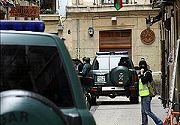
Court 61 of the Spanish High Court has ordered on Monday that court committees will enter all "herriko tabernas" (Basque pro independence clubs or bars, called "peoples bars") in order to draw up inventories of the goods of the leftist party. The action is part of the process to account the assests that began in March 2003 when Batasuna was banned.
Precisely, security forces got into several premises by midday: the "herriko" (peoples club) of Gasteiz, the one in Salvatierra and two other in Iruña (in La Rochapea and La Txantrea neighbourhoods), according to EiTB. A bar in Berriozar (Navarre) has also been registered.
Short later, the Civil Guard have sealed the peoples clubs in Donostia-San Sebastian, as well as in Portugalete and Bilbao's Santutxu neighbourhood (Bizkaia), where some incidents have taken place.
The order establishes one-month period for Batasuna to allege. It also requests from judge Baltasar Garzon all the documents that investigate the financing of ETA through pub-like herriko taberna.
EUROPEAN PARLIAMENT
Debate on Basque process at the centre of EU parliament's agenda
10/23/2006
A priori, the motion that boosts a dialogued channel has the support of most of the parliament groups. The presence of Basque delegations would be wide since all Basque groups consider the event very significant.
 o
oThe Basque conflict is at the centre of the European agenda. There's barely two days to go and groups in the European parliament as well as Basque parties take stands. If predictions come true, the motion in favour of a dialogued channel has guaranteed the support of most of the parliament groups. Meanwhile, Spain's Conservative PP and its allies try to exert pressure by making critical statements and organising demonstrations. España y Libertad (an organisation in favour of the unity of Spain) for instance, has summoned a gathering on Monday in front of the European parliament at 06:30 pm.
A wide representation of the Basque political spectrum is expected, such as a delegation of the Basque government led by spokeswoman Miren Azkarate and councillors Esther Larrañaga and Javier Madrazo. Representatives of Basque Nationalist EA, BATASUNA, of trade union LAB, and of Aquitaine will attended the meeting, as well as Irish mediator Father Alec Reid.
Spain's High Court judge Santiago Pedraz has allowed LAB secretary general Rafa Díez Usabiaga to fly to Strasbourg to attend the debate. Díaz Usabiaga is accused in the proceedings that investigate the financing of ETA through the "herriko tabernas" network (pub-like offices).
Day's plan
The debate will open on Wednesday 25th at 09:00 am. The European Commission, the EU Council and representatives of each political group will take part at the event.
Subsequently, members of parliament will vote the resolutions of the different groups around 12:30 pm.
Stands of Basque parties
President of PNV party Josu Jon Imaz has stated that his party, which "has always believed in Europe" and "has always bet on its political significance", will be on Wednesdays in Strasbourg. He has considered "very important and decisive" the support of the EU to the peace process in the Basque Country.
BATASUNA considers that this mean that the basque conflict is right now in the euroean agenda and it is recognized as an european issue.




